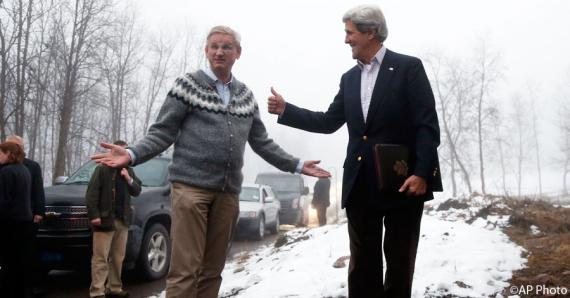Half of the Arctic has mutinied. With Russia currently chair of the Arctic Council in a term that will last until May 2023, in a response to the country’s invasion of Ukraine, seven of the multilateral organization’s eight members—the U.S., Canada, Iceland, Denmark, Norway, Sweden, and Finland—issued a joint statement announcing that they were “pausing participation in all meetings of the Council and its subsidiary bodies.” So much for Russia’s chairmanship theme of “responsible governance for a sustainable Arctic.”
When the Kremlin launched an invasion of Crimea in February 2014, which now seems like a dark form of child’s play in comparison to the ongoing events, Canada was chair of the Arctic Council. The next month in March, Canada still went ahead with hosting meetings in Yellowknife, which Russian representatives attended. Perhaps the strongest response Canada offered was to boycott Arctic Council meetings in Russia the following month. Canadian Environment Minister Leona Aglukkaq stated, “As a result of Russia’s illegal occupation of Ukraine and its continued provocative actions in Crimea and elsewhere, Canada will not be attending working-group level meetings in Moscow this week…Canada will continue to support the important work of the Arctic Council.” Apart from that, Arctic Council meetings continued to convene with representatives of all eight member states present, including at the biannual meetings of Senior Arctic Officials, as political scientist Michael Byers details in his examination of Arctic cooperation before and after the annexation of Crimea.

There were still other breaks in Arctic cooperation, many of them emanating from the U.S. under the Obama administration. The country withdrew funds for a hazard reduction workshop meant to be attended by both American and Russian scientists. The U.S. also imposed sanctions banning the export of technology, and eventually goods and services, in support of Russia’s “deep water, Arctic offshore or onshore shale rock formation projects.” But overall, circumpolar dialogue and cooperation persisted.
The halting of Arctic Council meetings represents a major break to the organization’s history and to its self-perception as a facilitator of dialogue between Russia and the West, which is immune to breakdowns elsewhere. This time, geopolitics below the Arctic Circle has infected the region.
We now feel a very long way from the cozy “Arctic casual” vibe of 2013, when former US Secretary of State John Kerry could give a thumbs up to sweater-clad former Swedish prime minister Carl Bildt. In the less than a decade since then, Britain left the European Union, Trump was elected in the U.S., Russia invaded Ukraine, and a pandemic swept the planet. Still, Arctic Council cooperation persisted, building steadily on its accomplishments since its founding in 1996. It took a second Russian invasion of Ukraine to break the camel’s back. Hopefully, the pause is only a respite.


In my next post on Monday, I’ll examine how while Arctic geopolitics is facing a freeze, Arctic geoeconomics remain largely uninterrupted. Russian gas continues to course into Europe, warming its millions of homes while funding the missiles that are destroying Ukrainian ones—and, all the while, hollowing out the tundra beneath reindeer herders’ feet.


Would the AC response be different if RU wasn’t chair? Does Byers’ point about a mature state of interdependencies still hold or did the region begin a transition away from cooperation?
Thanks for your comment, Mike — I think that the response would probably be different if Russia were not chair. As for Byers’ point about a mature state of interdependencies, I would reckon that the Ukraine crisis has opened a paradigm shift in cooperation. I do think it was already fracturing though in recent years (exacerbated by the U.S. in particular, with the 2019 Ministerial, where Pompeo lambasted China and was generally antagonistic, being the first not to produce a joint declaration: https://www.highnorthnews.com/en/first-ever-arctic-council-ministerial-meeting-without-joint-declaration).